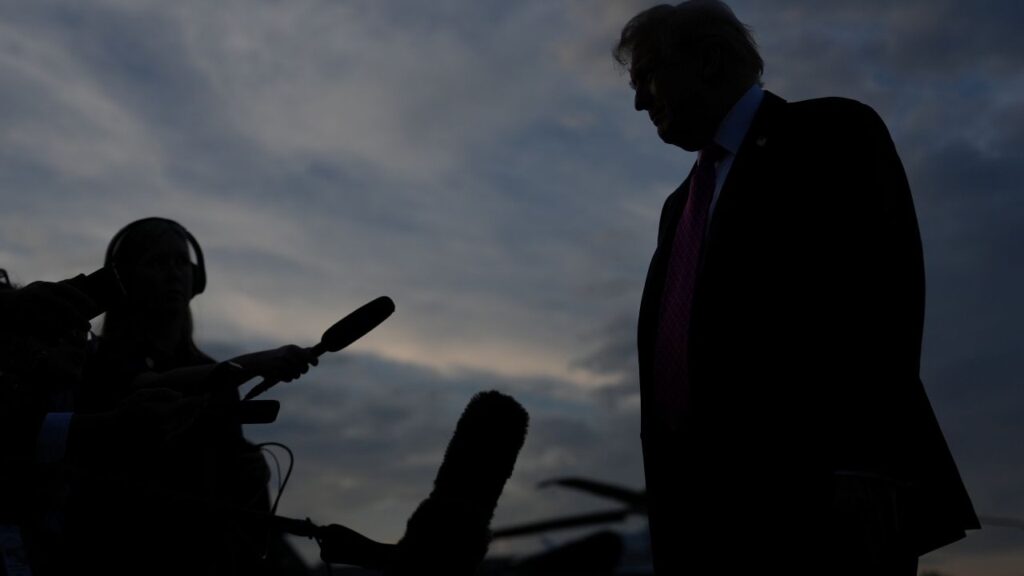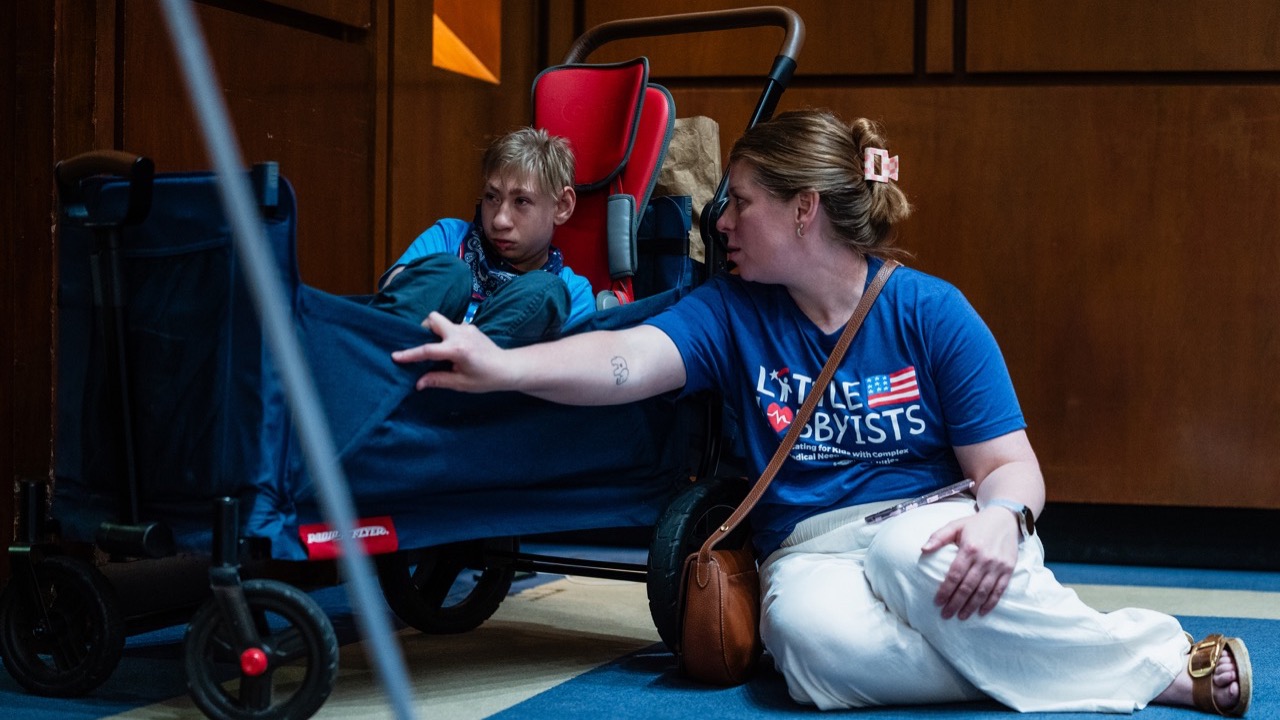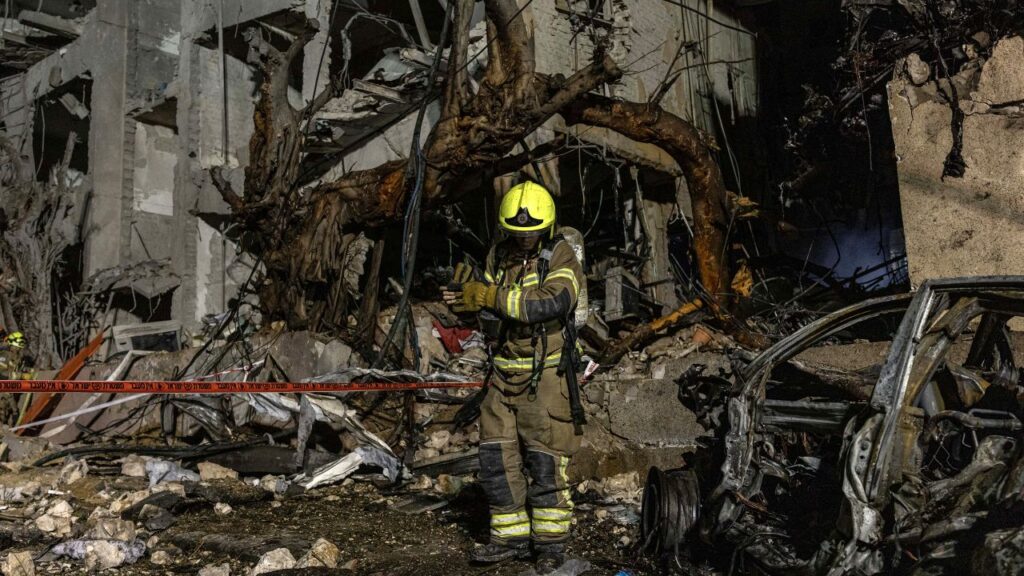Chelsea Anders, 40, comforts James Dole, 9, both members of Little Lobbyists, during a forum titled “The Big Beautiful Betrayal” at the Hart Senate Office Building in Washington, June 17, 2025. About two dozen children and their family members made their way through the halls of Congress this week to make their case against the “big, beautiful bill.” (Eric Lee/The New York Times)

- Children with disabilities lobby senators against Republican bill that would slash Medicaid funding.
- Families fear proposed cuts could make medical care more difficult and costly to obtain.
- Senate version includes more aggressive Medicaid reductions than House-passed legislation.
Share
WASHINGTON — Landry Bell, a 1-year-old boy who was born with Down syndrome, wriggled and smiled in his big sister’s lap on the floor outside Republican Sen. Mike Lee’s office this week as he took a break from going office to office with his mother while she explained how cuts to Medicaid would devastate their family.
Wearing a bright blue T-shirt emblazoned with the words “Little Lobbyists,” Landry was among a group of children with serious medical needs who crisscrossed the Capitol with their parents urging senators to vote “no” on the sprawling Republican bill carrying President Donald Trump’s agenda. The legislation would cut deeply into Medicaid to help pay for large tax cuts that would benefit businesses and the richest Americans.
The Senate version of the legislation would make even more aggressive cuts to Medicaid than the version of the legislation that passed the House last month. Those proposed reductions, and the elimination of some clean-energy tax credits, are among the most contentious provisions driving debate on the bill among Republicans as party leaders push to complete it and send it to Trump’s desk within weeks.
Families Rally Against Proposed Cuts
The Little Lobbyists formed in 2017 during Trump’s first term to push back against Republican efforts to repeal the Affordable Care Act, taking to Capitol Hill to demand that lawmakers oppose the move. Their successful campaign to save the law was part of a broader backlash against the proposal, which was driven in large part by major health care lobbies, like hospitals and insurance companies, as well as patient groups worried about losing insurance coverage.
This year, the bigger lobbying players have been more muted about the Republican policy measure that Trump and his party are calling their “big, beautiful bill,” which Democrats decry as an abomination. There are fewer television ads and demonstrations and fewer furious public statements from health provider groups warning about the potential effects of the cuts.
But the little ones are out in force. About two dozen children and their family members made their way through the halls of Congress this week to make their case against the bill. They scored meetings with Sen. Susan Collins, R-Maine, the chair of the Appropriations Committee; Sen. John Fetterman, D-Pa.; Sen. Jon Husted, R-Ohio; and aides for eight other Republican senators, including Lee of Utah.
Joining Landry were several other children who navigated the marble hallways in wheelchairs or medical strollers. Some relied on feedings through a tube during the long day of meetings. The children, many of them nonverbal, crowded into senators’ offices. At one stop, they snapped photos with Husted and his wife, Tina. At another, they sat on a couch alongside Collins as their parents made their case against slashing Medicaid.
“To take it away completely would just be devastating,” said Charlotte Cravins, Landry’s mother, who said that even with private health insurance, her family had been on the verge of bankruptcy from her son’s hospital bills until they were approved for Medicaid coverage.
Concerns Over Program Changes
Although the measure would not directly impact services that medically complex children receive, their families have mobilized against it, fearing that some of the Medicaid cuts could reverberate through the program, ultimately making it more difficult and costly for them to get the care they need.
The message dovetails with the one that Democrats have been making as they condemn the bill, arguing that it will harm the poorest and most vulnerable people.
“If you were to cut Medicaid, things aren’t going to get better; they’re going to get worse,” Rep. Hakeem Jeffries, D-N.Y. and the minority leader, said Wednesday during a visit to a hospital in Brooklyn. “Children will be hurt. Everyday Americans will be hurt. People who rely on Medicaid with disabilities will be hurt. Many older Americans will be hurt.”
Republicans argue the changes they are proposing to Medicaid are designed to refocus resources on its most vulnerable beneficiaries. But the cuts could leave big holes in some states’ budgets, including in Louisiana, where Landry and his family live.
The Senate proposal would slash a widely used — if convoluted — strategy that many states employ to finance their Medicaid programs. How states will adjust is unclear. Some might cut back on payments to medical providers, which could reduce the number of physicians willing to treat children in Medicaid. Others might choose to eliminate a few optional benefits in the program.
“It’s a fallacy to think that the federal government can do this level of substantial cuts to Medicaid and that states won’t have to make hard decisions that impact the most vulnerable people on Medicaid,” said Gwen Orlowski, executive director of Disability Rights New Jersey.
Political Opposition Intensifies
Democrats have hammered the message as they rail against the package, which Republicans are moving through Congress using special rules that shield it from a filibuster, leaving Democrats powerless to defeat it if the GOP stays unified.
At a House hearing in May, Democrats held up photos of disabled, young or senior constituents as they talked about Medicaid’s essential role in protecting the vulnerable. Patients in wheelchairs were seated prominently in the hearing room, and some were escorted out after disrupting the proceedings to protest the bill.
Many of the bill’s cuts are reserved for adults without disabilities. A large chunk of its savings comes from a strict work requirement for Americans who gained Medicaid coverage through an expansion of the program created by the Affordable Care Act and through other increases in paperwork requirements that would require beneficiaries to prove their eligibility more often.
But the cuts to state Medicaid financing in the Senate bill could have broader implications, including shuttering some rural hospitals, an issue that has drawn the attention of Sen. Josh Hawley, R-Mo.
“It’s just not the right thing to do to shut down a bunch of rural hospitals to pay for tax cuts,” Hawley said this week as he remarked that his party’s bill “needs a lot of work.”
When a child with disabilities needs medical care, a rural hospital may be their first stop before transferring to a larger hospital that can provide advanced care.
“If those rural hospitals stop existing, either those children die, or their families are forced to move, assuming they have enough money to be able to move,” said Matthew Cortland, a senior adviser with Little Lobbyists. “So we are deeply concerned.”
—
This article originally appeared in The New York Times.
By Megan Mineiro and Margot Sanger-Katz/Eric Lee
c. 2025 The New York Times Company
RELATED TOPICS:
Categories

Who Could Take Over for Ayatollah Ali Khamenei?

Why Have You Started This War, Mr. President?


















